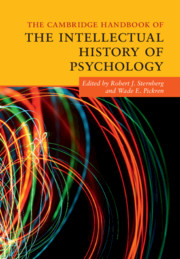Book contents
- The Cambridge Handbook of the Intellectual History of Psychology
- The Cambridge Handbook of the Intellectual History of Psychology
- Copyright page
- Contents
- Figures
- Tables
- Contributors
- Introduction
- 1 Major Paradigms and Approaches in Psychology
- 2 Methodology in Psychology
- 3 Neuroscience in Psychology
- 4 Sensation and Perception
- 5 Attention: Awareness and Control
- 6 Learning
- 7 Memory
- 8 Decision-Making
- 9 Creativity
- 10 Intelligence
- 11 Development
- 12 Social Psychology
- 13 Gender
- 14 Emotion
- 15 Motivation
- 16 Personality
- 17 Abnormal Psychology
- 18 Psychotherapy
- 19 Health Psychology
- Index
- References
1 - Major Paradigms and Approaches in Psychology
Published online by Cambridge University Press: 18 May 2019
- The Cambridge Handbook of the Intellectual History of Psychology
- The Cambridge Handbook of the Intellectual History of Psychology
- Copyright page
- Contents
- Figures
- Tables
- Contributors
- Introduction
- 1 Major Paradigms and Approaches in Psychology
- 2 Methodology in Psychology
- 3 Neuroscience in Psychology
- 4 Sensation and Perception
- 5 Attention: Awareness and Control
- 6 Learning
- 7 Memory
- 8 Decision-Making
- 9 Creativity
- 10 Intelligence
- 11 Development
- 12 Social Psychology
- 13 Gender
- 14 Emotion
- 15 Motivation
- 16 Personality
- 17 Abnormal Psychology
- 18 Psychotherapy
- 19 Health Psychology
- Index
- References
Summary
Psychology became an independent subject during the nineteenth and early twentieth centuries. Competing approaches to psychology, called schools, arose during this period. Each school had different views concerning the proper subject matter and research methods for psychology. Introspectionism analyzed subjective experience using experimental methods. Behaviorism rejected the study of subjective experience and insisted on objective methods. Functionalism was inspired by Darwin’s evolutionary theory and was open to the use of a variety of methods. Gestalt psychology studied subjective experience but took a holistic approach rather than the analytic approach of introspectionism. Psychoanalysis was a theory of development and personality based largely on clinical experience. The differences between the schools were never completely resolved, and psychologists wondered if there would ever be a paradigm that provided a unified approach to the subject. Cognitive psychology, which appropriated information-theoretic and computational approaches, appeared to some to provide such a paradigm. However, no single approach to psychology emerged triumphant. Indeed, many psychologists are flexible enough to tailor their approach to the problem on which they are working rather than use the same approach regardless of the nature of the problem.
Keywords
- Type
- Chapter
- Information
- Publisher: Cambridge University PressPrint publication year: 2019
References
- 2
- Cited by

